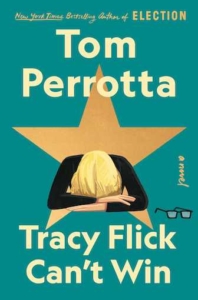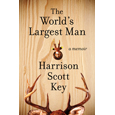Re-election
Tom Perrotta delivers up-to-the-minute satire in Tracy Flick Can’t Win
Every few years, Tom Perrotta does it again. With plots that seem ripped from the headlines and characters who are both emblematic and unique, he weaves together the evergreen and the contemporary, perfectly capturing the suburban middle-American zeitgeist he’s staked an expert claim to in book after book after book.

His latest, Tracy Flick Can’t Win, looks both backward and forward. On the one hand, it’s a sequel to Election, the 1998 novel that director Alexander Payne turned into a wickedly brilliant movie starring Reese Witherspoon and Matthew Broderick. On the other hand, it’s a thoroughly pertinent, up-to-the-minute satire of contemporary mores and concerns, whose eponymous heroine has apparently aged in real time, right alongside her readers and fans.
The premise is this: Tracy Flick, whose ferocious ambition to be president of her high school propelled Election’s plot, has grown up to be (of course!) an assistant high school principal determined to become tops in the administrative hierarchy. When the current principal steps down, she naturally assumes she’s headed for the throne. But a constellation of complications intervenes, and Tracy finds herself — again — stymied by colleagues and circumstance.
They’re not the same colleagues, nor the same circumstances. Still, there’s a structural similarity between Tracy’s old obstacles and her new ones. The cast of characters in Tracy Flick Can’t Win includes jocks, nerds, parents, teachers, and administrators, and the milieu in which the action unfolds — a suburban high school in New Jersey — is virtually identical to Election’s. Yet, in the decades that separate the two books, the cultural landscape of America has changed, and these drastic alterations subtend the new novel’s every scene.
 It’s tempting to think that Perrotta wrote Tracy Flick Can’t Win in an attempt to revise and revisit the problematic central premise of Election. Take 16-year-old Tracy’s very first monologue in the earlier book. “All right, so I slept with my English teacher and ruined his marriage,” she says, daring us to judge. “Crucify me. Send me to bad girl prison with Amy Fisher and make TV movies about my pathetic life.” This, it hardly needs saying, hits very differently in 2022. What once looked like pluck (Tracy’s most winning characteristic) now feels like denial. The world has changed, and anyone who uses teacher/student intercourse as a plot device is setting himself up for big trouble. Authors have been raked over the coals for far less.
It’s tempting to think that Perrotta wrote Tracy Flick Can’t Win in an attempt to revise and revisit the problematic central premise of Election. Take 16-year-old Tracy’s very first monologue in the earlier book. “All right, so I slept with my English teacher and ruined his marriage,” she says, daring us to judge. “Crucify me. Send me to bad girl prison with Amy Fisher and make TV movies about my pathetic life.” This, it hardly needs saying, hits very differently in 2022. What once looked like pluck (Tracy’s most winning characteristic) now feels like denial. The world has changed, and anyone who uses teacher/student intercourse as a plot device is setting himself up for big trouble. Authors have been raked over the coals for far less.
Right off the bat, and to its credit, Tracy Flick Can’t Win acknowledges Election’s fundamental ickiness. “For months it had been an almost daily occurrence, one powerful man after another toppled from his pedestal, exposed as a sexual predator: Harvey Weinstein in his bathrobe, Bill Cosby with his quaaludes, Matt Lauer and his secret button, the list went on and on,” Tracy tells us on the new novel’s very first page. The world has changed, and teenaged Tracy’s insistence that she’s fine, not damaged, certainly not a victim, is beginning, to her dismay, “to feel a little shaky.”
Watching the news with her 10-year-old daughter (Tracy, like her mom before her, is a single parent), reading “these stories, one after the other, all these high achieving young women exploited by teachers and mentors and bosses,” she’s forced to reckon with her former self. “It gnawed at me that summer, the possibility that I’d misjudged my own past, that maybe I’d been a little more ordinary than I would have liked to believe,” she thinks. Yet she can’t let go. “The thing you have to understand — it seemed so obvious to me at the time, so central to my own identity — is that I wasn’t a normal high school girl,” she tells the reader firmly. “I felt like an adult long before I came of legal age, and it had always seemed to me that Mr. Dexter simply perceived this truth before anyone else, and had treated me accordingly, which was exactly the way I’d wanted to be treated. How could I blame him for that?”
Tracy’s no fool — she knows about denial. “In fact it had become pretty clear to me that that was how it worked — you got tricked into feeling more exceptional than you actually were,” she says. That feeling of specialness, of being singled out among her peers, none of whom appreciated her brilliance and ambition anyway, has colored Tracy’s entire life. So she slept with her English teacher. So what? We see her point while also seeing through her point, and it’s heartbreaking.
But Tracy Flick Can’t Win is more than just a hasty rewrite of an outmoded, potentially outrageous book. Perrotta loves nothing more than tossing characters into a moral deep end, sitting back, and letting readers watch them thrash and splutter; this builds both sympathy and schadenfreude, since who among us can claim to have all the answers? We’re all damaged by the past, and we’re doing the best we can in the present. If nothing else, his latest book confirms what many of us have always secretly suspected. Adulthood, Perrotta suggests, is forged in the crucible of high school, and we spend the rest of our lives torn between trying to transcend our adolescent selves and trying to preserve them. In that sense, Tracy Flick is, despite her insistence, utterly ordinary, after all.

From 2012 to 2016, Fernanda Moore was the fiction critic for Commentary. Her work has also appeared in The New York Times Magazine, Marie Claire, New York, and Southern Living, among others.


